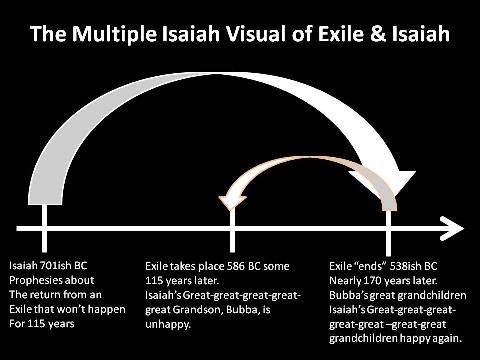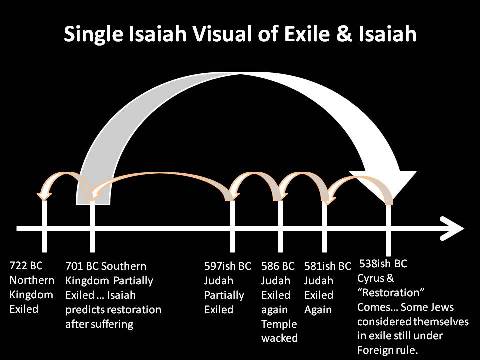One of the things I’ve learned about debate is that you can present powerful, yet, utterly false arguments for almost any position you choose to take. Debate is not about being right, it’s about convincing people… and if you can humiliate your opponent at the same time, Kudos! (And kudos comes from the Greek κῦδος so it’s funny and smart.)
In a similar way, consensus is about a group being convinced. A consensus among people, even experts, does not guarantee anything… especially when money is on the line.
Now, if Kermit the Frog thinks it aint easy being green, he should try being a One-Isaiah-Scholar. I’ve actually been laughed at in classes at Trinity Evangelical Divinity School for even proposing the possibility that a single individual wrote both halves of the book of Isaiah… and that was by conservatives who believe in the validity of divine prophecy.
In my post, “A Handy Dandy Summary of the Major Reasons for Supporting the Incorrect Two Isaiah Theory,” I describe the three major reasons even good Evangelicals have for believing that Isaiah 40-66 was written by one or more people other than Isaiah. These are not insignificant.
- The structure of the book breaks cleanly into two distinct pieces… with a narrative bridge between them. They look like two books artificially held together.
- The writing style from the 1st half to the 2nd half shifts RADICALLY. The 1st being choppy with constantly shifting discussions and the 2nd being smooth and consistent as a baby’s… ummm… as an unused cue ball.
- They question the logic of suggesting that chapters 40-66 could have had any depth of meaning for the Isaian community. Those souls were over 100 years removed from the beginning of the Exile described there and some 170 years (depending how you count them) from the beginning of the return from that Exile, which the chapters celebrate.[1]
Okay, so, here I want to address # 3. In two following posts I will address arguments 2 and 1 respectively, if not respectfully… just kidding, I have great respect for the two Isaiah theory… I just happen to think it’s wrong.
In partial answer to #3 above let me suggest (which is a wishy-washy non-committal way of saying “insist upon” in the hopes of gaining a hearing with people who disagree with you) that the entire concept that Isaiah’s audience could not truly appreciate the glowing promises of a return from an exile that they were still a century away from experiencing (say that ten times fast) is based on a false notion of Exile.
Most fixate on the exile of 586 BC as THE Exile, but The Exile began during Isaiah’s life. Isaiah seems to have ministered from at least 742ish to 687ish… if the story of his execution by Mannasseh is a trustworthy tradition. (He was supposedly stuffed in a log and sawn in two.)
With BC dates, remember to count backwards to move forwards.
There were Assyrian devastations in the Northern Kingdom in 732BC and a sweeping exile of the same in 722 BC. Both Biblical and Assyrian records count out a massive exile of the people of Judah during the 701 BC invasion of Sennacherib… he says hundreds of thousands. Then after a time the exile continues with a sweep by Babylon in 597 BC, 586 BC, & 581 BC. Exile is a condition that begins during Isaiah’s life and continues physically through the edict of Cyrus permitting the Jews to go home, 538ish BC. And how big is an Ish? Ask a fisherman.
I’ll return to this issue of Exile later, but one other element of this “psychological” argument poses a problem. The Israelite community seems to possess a stronger sense of corporate identity than Westerners do. The promise of restoration for their ancestors, even if generations of them will suffer under bondage in the meantime, is not without meaning. The fact that they presently suffer this oppression and see it reaching even greater depths in the coming generations does not obliterate the comfort to be had in seeing it and its end as part of YHWH’s plan for them… for they and their children are in YHWH’s hands.
By comparison, consider Abraham’s joy over his own promised inheritance.
- Gen 15:13-16 “Then the LORD said to Abram, “Know for certain that your offspring will be sojourners in a land that is not theirs and will be servants there, and they will be afflicted for four hundred years. But I will bring judgment on the nation that they serve, and afterward they shall come out with great possessions…. And they shall come back here in the fourth generation…”
- Hebrews 11:13 “These all died in faith, not having received the things promised, but having seen them and greeted them from afar, and having acknowledged that they were strangers and exiles on the earth.”
- Acts 7:2ff “The God of glory appeared to our father Abraham when he was in Mesopotamia, before he lived in Haran, and said to him, ‘Go out from your land and from your kindred and go into the land that I will show you.’ Then he went out from the land of the Chaldeans and lived in Haran. And after his father died, God removed him from there into this land in which you are now living. Yet he gave him no inheritance in it, not even a foot’s length, but promised to give it to him as a possession and to his offspring after him, though he had no child.
This doesn’t prove the one Isaiah position, “proof” is coming, but it does raise questions about one of the pillars for the multiple Isaiah theory.
[1] There are other reasons but these are the big ones. Without these the others tend to pale in importance.
Discover more from Biblical Literacy with Dr. Andrew D. Sargent
Subscribe to get the latest posts sent to your email.




